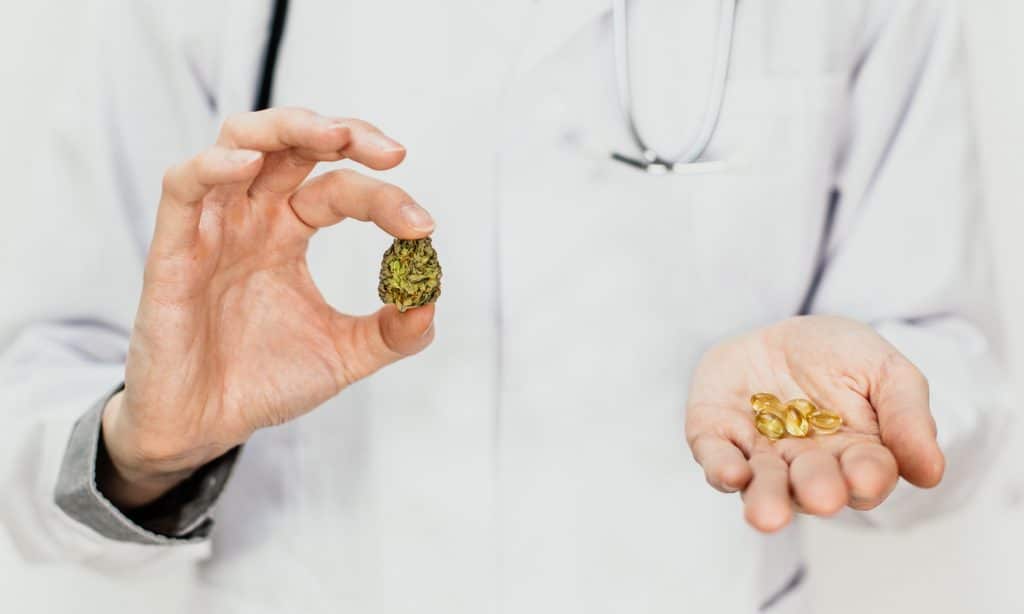You are here
Home 🌿 Medical Cannabis News 🌿 Cannabis And Lou Gehrig’s Disease: Here’s What You Should Know 🌿Cannabis And Lou Gehrig’s Disease: Here’s What You Should Know

ALS causes the degeneration of nerves that control voluntary muscle movement, like those that allow us to chew, speak, and walk.
Charlie Wedemeyer was one of Hawaii’s greatest athletes when he attended Punahou School in the 1960s. He was the quarterback for the football team, but also excelled at basketball and baseball. Charlie was named the Hawaii Prep Athlete of the 1960’s and went on to play football for Michigan State.
In 1978 Charlie was the football coach at Los Gatos High School in California when he was diagnosed with Amyotrophic Lateral Sclerosis (ALS). Like many athletes before him, including the great Lou Gehrig, Charlie Wedemeyer would find a fight he could not win in ALS.
What Is ALS?
ALS (also known as Lou Gehrig’s Disease) is a fatal motor neuron disease, affecting an estimated 30,000 Americans. ALS causes the degeneration of nerves that control voluntary muscle movement, like those that allow us to chew, speak, and walk. When the nerves die, they stop sending messages to the muscles which causes gradual weakening, twitching, and wasting away.
Patients with ALS become weak, but remain quite conscious. They are completely aware of their progressive disability. Eventually, the brain can no longer initiate or control voluntary movements. Death often results from respiratory failure when the nerves that control breathing lose the ability to function.
We don’t know what causes ALS. There is a genetic mutation that affects 5 to 10 percent of patients, but most cases are sporadic with no clear risk factors or family history of the disease. Athletes and those who have served in the military have a higher incidence of ALS, but we have not been able to find a clear causal connection for this observation. ALS is recognized as a service-connected disease by the U.S. Department of Veterans Affairs.

Conventional Treatment For ALS
There is no known cure for ALS. There are prescription medications approved by the FDA to treat the disease by reducing damage to nerves or by slowing the decline of function. These drugs may prolong life, but neither drug stops the disease in its tracks.
Other prescription medications are used to treat the symptoms of ALS. Muscle cramps, stiffness, and drooling are common, as are disturbing uncontrollable episodes of laughing or crying caused by destruction of brain tissue. Pain, depression, sleep problems and constipation may also be managed by medication, some more successfully than others.
Cannabinoids: Antioxidants And Neuroprotectants
Nerve damage in ALS is caused by two significant factors: oxidative stress and excitotoxicity. Cannabis shows promise as an aid in managing some of the nerve damage, as it has been shown to generally address both factors, though specific studies on ALS and cannabis have yet to be done.
Oxidative stress occurs when there is an imbalance between free radicals and antioxidants within the body. When the production of antioxidants can’t keep up with production of free radicals, we are not able to detoxify from the free radicals’ harmful effects in the body. Cannabis is a known antioxidant and helps to decrease the nerve tissue damage that free radicals can cause.
Excitotoxicity destroys nerve tissue that has already been compromised. When nerve tissue is injured, the amino acid glutamate is released in excessive, uncontrolled amounts. This excess leads to cell death, a destructive process called excitotoxicity. CBD and THC both decrease the release of glutamate, thus sparing the neurons from excitotoxity and cell death.
Nerve damage in ALS is caused by two significant factors: oxidative stress and excitotoxicity. Cannabis has been shown to address both.

Photo by Esther Kelleter/EyeEm/Getty Images
The Proof Is In The Patents
These cannabinoid qualities are well-known and recognized as therapeutic. The US government filed Federal Patent #US 6630507 B1 in 1999 that specifically identifies cannabinoids as antioxidants and neuroprotectants:
“The cannabinoids are found to have particular application as neuroprotectants, for example in limiting neurological damage following ischemic insults, such as stroke and trauma, or in the treatment of neurodegenerative diseases…”
Considering the neuroprotective effects of cannabinoids and the anti-spastic effects of cannabinoids in multiple sclerosis patients, it only makes sense to consider their use in ALS. Preclinical work and some patient reports are promising.
What Research Exists?
“Preclinical data indicate that cannabis has powerful antioxidative, anti-inflammatory, and neuroprotective effects. Cannabis also has properties applicable to symptom management of ALS, including analgesia, muscle relaxation, bronchodilation, saliva reduction, appetite stimulation, and sleep induction. With respect to the treatment of ALS, from both a disease modifying and symptom management viewpoint, clinical trials with cannabis are the next logical step. Based on the currently available scientific data, it is reasonable to think that cannabis might significantly slow the progression of ALS, potentially extending life expectancy and substantially reducing the overall burden of the disease.”
Managing ALS With Cannabis
THC and CBD are considered the most helpful phytocannabinoids for patients with ALS. Any clinical feedback ALS patients provide on the use and effectiveness of cannabinoid medicine will encourage further research and the publication of well-designed clinical studies.
420 Intel is Your Source for Marijuana News
420 Intel Canada is your leading news source for the Canadian cannabis industry. Get the latest updates on Canadian cannabis stocks and developments on how Canada continues to be a major player in the worldwide recreational and medical cannabis industry.
420 Intel Canada is the Canadian Industry news outlet that will keep you updated on how these Canadian developments in recreational and medical marijuana will impact the country and the world. Our commitment is to bring you the most important cannabis news stories from across Canada every day of the week.
Marijuana industry news is a constant endeavor with new developments each day. For marijuana news across the True North, 420 Intel Canada promises to bring you quality, Canadian, cannabis industry news.
You can get 420 Intel news delivered directly to your inbox by signing up for our daily marijuana news, ensuring you’re always kept up to date on the ever-changing cannabis industry. To stay even better informed about marijuana legalization news follow us on Twitter, Facebook and LinkedIn.




